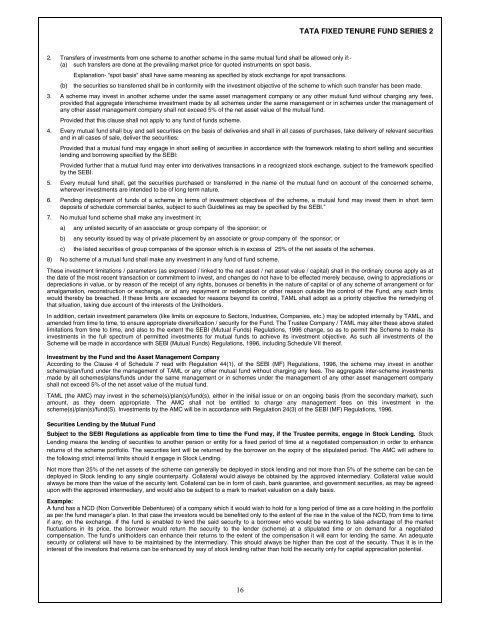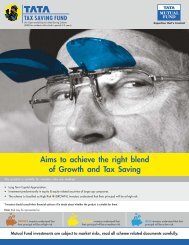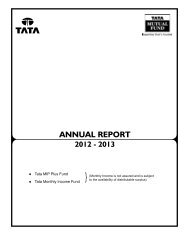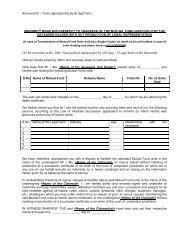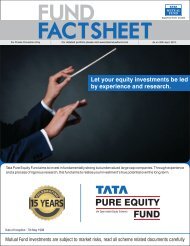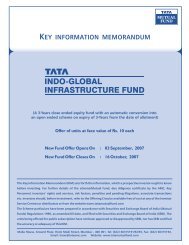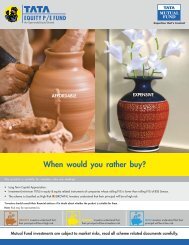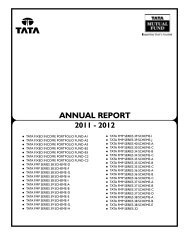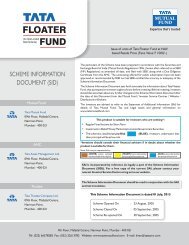Tata Fixed Tenure Fund Series - 2 Scheme B - Securities and ...
Tata Fixed Tenure Fund Series - 2 Scheme B - Securities and ...
Tata Fixed Tenure Fund Series - 2 Scheme B - Securities and ...
You also want an ePaper? Increase the reach of your titles
YUMPU automatically turns print PDFs into web optimized ePapers that Google loves.
TATA FIXED TENURE FUND SERIES 2<br />
2. Transfers of investments from one scheme to another scheme in the same mutual fund shall be allowed only if:-<br />
(a) such transfers are done at the prevailing market price for quoted instruments on spot basis.<br />
Explanation- “spot basis” shall have same meaning as specified by stock exchange for spot transactions.<br />
(b) the securities so transferred shall be in conformity with the investment objective of the scheme to which such transfer has been made.<br />
3. A scheme may invest in another scheme under the same asset management company or any other mutual fund without charging any fees,<br />
provided that aggregate interscheme investment made by all schemes under the same management or in schemes under the management of<br />
any other asset management company shall not exceed 5% of the net asset value of the mutual fund.<br />
Provided that this clause shall not apply to any fund of funds scheme.<br />
4. Every mutual fund shall buy <strong>and</strong> sell securities on the basis of deliveries <strong>and</strong> shall in all cases of purchases, take delivery of relevant securities<br />
<strong>and</strong> in all cases of sale, deliver the securities:<br />
Provided that a mutual fund may engage in short selling of securities in accordance with the framework relating to short selling <strong>and</strong> securities<br />
lending <strong>and</strong> borrowing specified by the SEBI:<br />
Provided further that a mutual fund may enter into derivatives transactions in a recognized stock exchange, subject to the framework specified<br />
by the SEBI.<br />
5. Every mutual fund shall, get the securities purchased or transferred in the name of the mutual fund on account of the concerned scheme,<br />
wherever investments are intended to be of long term nature.<br />
6. Pending deployment of funds of a scheme in terms of investment objectives of the scheme, a mutual fund may invest them in short term<br />
deposits of schedule commercial banks, subject to such Guidelines as may be specified by the SEBI.”<br />
7. No mutual fund scheme shall make any investment in;<br />
a) any unlisted security of an associate or group company of the sponsor; or<br />
b) any security issued by way of private placement by an associate or group company of the sponsor; or<br />
c) the listed securities of group companies of the sponsor which is in excess of 25% of the net assets of the schemes.<br />
8) No scheme of a mutual fund shall make any investment in any fund of fund scheme.<br />
These investment limitations / parameters (as expressed / linked to the net asset / net asset value / capital) shall in the ordinary course apply as at<br />
the date of the most recent transaction or commitment to invest, <strong>and</strong> changes do not have to be effected merely because, owing to appreciations or<br />
depreciations in value, or by reason of the receipt of any rights, bonuses or benefits in the nature of capital or of any scheme of arrangement or for<br />
amalgamation, reconstruction or exchange, or at any repayment or redemption or other reason outside the control of the <strong>Fund</strong>, any such limits<br />
would thereby be breached. If these limits are exceeded for reasons beyond its control, TAML shall adopt as a priority objective the remedying of<br />
that situation, taking due account of the interests of the Unitholders.<br />
In addition, certain investment parameters (like limits on exposure to Sectors, Industries, Companies, etc.) may be adopted internally by TAML, <strong>and</strong><br />
amended from time to time, to ensure appropriate diversification / security for the <strong>Fund</strong>. The Trustee Company / TAML may alter these above stated<br />
limitations from time to time, <strong>and</strong> also to the extent the SEBI (Mutual <strong>Fund</strong>s) Regulations, 1996 change, so as to permit the <strong>Scheme</strong> to make its<br />
investments in the full spectrum of permitted investments for mutual funds to achieve its investment objective. As such all investments of the<br />
<strong>Scheme</strong> will be made in accordance with SEBI (Mutual <strong>Fund</strong>s) Regulations, 1996, including Schedule VII thereof.<br />
Investment by the <strong>Fund</strong> <strong>and</strong> the Asset Management Company<br />
According to the Clause 4 of Schedule 7 read with Regulation 44(1), of the SEBI (MF) Regulations, 1996, the scheme may invest in another<br />
scheme/plan/fund under the management of TAML or any other mutual fund without charging any fees. The aggregate inter-scheme investments<br />
made by all schemes/plans/funds under the same management or in schemes under the management of any other asset management company<br />
shall not exceed 5% of the net asset value of the mutual fund.<br />
TAML (the AMC) may invest in the scheme(s)/plan(s)/fund(s), either in the initial issue or on an ongoing basis (from the secondary market), such<br />
amount, as they deem appropriate. The AMC shall not be entitled to charge any management fees on this investment in the<br />
scheme(s)/plan(s)/fund(S). Investments by the AMC will be in accordance with Regulation 24(3) of the SEBI (MF) Regulations, 1996.<br />
<strong>Securities</strong> Lending by the Mutual <strong>Fund</strong><br />
Subject to the SEBI Regulations as applicable from time to time the <strong>Fund</strong> may, if the Trustee permits, engage in Stock Lending. Stock<br />
Lending means the lending of securities to another person or entity for a fixed period of time at a negotiated compensation in order to enhance<br />
returns of the scheme portfolio. The securities lent will be returned by the borrower on the expiry of the stipulated period. The AMC will adhere to<br />
the following strict internal limits should it engage in Stock Lending.<br />
Not more than 25% of the net assets of the scheme can generally be deployed in stock lending <strong>and</strong> not more than 5% of the scheme can be can be<br />
deployed in Stock lending to any single counterparty. Collateral would always be obtained by the approved intermediary. Collateral value would<br />
always be more than the value of the security lent. Collateral can be in form of cash, bank guarantee, <strong>and</strong> government securities, as may be agreed<br />
upon with the approved intermediary, <strong>and</strong> would also be subject to a mark to market valuation on a daily basis.<br />
Example:<br />
A fund has a NCD (Non Convertible Debentures) of a company which it would wish to hold for a long period of time as a core holding in the portfolio<br />
as per the fund manager’s plan. In that case the investors would be benefited only to the extent of the rise in the value of the NCD, from time to time<br />
if any, on the exchange. If the fund is enabled to lend the said security to a borrower who would be wanting to take advantage of the market<br />
fluctuations in its price, the borrower would return the security to the lender (scheme) at a stipulated time or on dem<strong>and</strong> for a negotiated<br />
compensation. The fund’s unitholders can enhance their returns to the extent of the compensation it will earn for lending the same. An adequate<br />
security or collateral will have to be maintained by the intermediary. This should always be higher than the cost of the security. Thus it is in the<br />
interest of the investors that returns can be enhanced by way of stock lending rather than hold the security only for capital appreciation potential.<br />
16


